George Soros: ‘Brexit hurts both sides – my money was used to educate the British public’
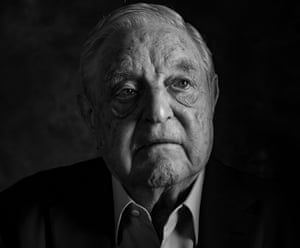
Around three decades ago, George Soros was introduced to a brash property magnate over dinner at a country house in the Catskills, upstate New York. Donald Trump was about to launch a New York office block, and he asked Soros to be his lead tenant. Soros was already a spectacularly successful financier, but told Trump he simply couldn’t afford it. “And that was just because I didn’t like him,” he tells me, smiling.
It’s not hard to see why Soros took such an instant dislike. Worldly, bookish, curious and somewhat shy, he tends to find other businessmen boring. He is unimpressed by celebrity, preferring the company of intellectuals, journalists and anyone he feels knows more about a given subject than he does. As a hedge fund manager, he was more likely to spend his free time reading and writing philosophy texts than hanging out on the golf course. If you had to conjure up a personality that is the polar opposite of the current president of the United States, it would look a lot like Soros.
We meet on a sunny October morning in the office of his New York residence, with views over the Central Park reservoir. It could easily be the consulting room of an upmarket psychotherapist rather than the headquarters of one of the world’s richest people – and, as both his critics and supporters would argue, one of the most influential. A few pieces of understated art decorate the cream-coloured walls; there are bookshelves lined with nonfiction and an air purifier hums quietly in the background. Unlike Trump Tower, just a couple of miles away down Fifth Avenue, there are no gold elevators here.
These days, the distance between Trump and Soros is about much more than personality and aesthetics. The president has become the most powerful among a global chorus of rightwing critics focused on Soros’s philanthropic efforts, which fund a broad range of causes they dislike, from minority rights and protecting refugees to liberalising drug policy and combating hate speech. Soros has long had enemies – largely, authoritarian leaders who were wary of his efforts to promote and protect democracy; more recently, this has been amplified by the antisemitic conspiracy theories that ooze from the darker corners of the internet.
It is now rare for a week to go by without a populist politician painting Soros as a ruthless Bond villain with nefarious plans to reshape the planet. Last year, Trump suggested that Soros might be paying illegal migrants to come to the US; in Turkey, President Erdoğan has called him “a man who assigns people to divide nations and shatter them”; in Italy, Matteo Salvini has claimed Soros wants the country “to become a giant refugee camp because he likes slaves”. Last month, Soros’s financial support for the anti-Brexit Best for Britain group led Jacob Rees-Mogg to call him the “Remoaner-in-chief” in parliament. Nigel Farage has called him “the biggest danger to the entire western world”.
As a reporter based in eastern Europe, I have had a ringside seat to the political hostility Soros has faced over the years. I spent a decade in Russia, where Vladimir Putin blamed him for organising revolutions in neighbouring countries; in 2015, his philanthropic foundations were banned from the country as a “threat to state security”. Last year I moved to Budapest, the city of Soros’s birth, where the far-right Hungarian prime minister, Viktor Orbán, had taken Soros-baiting to a new level, erecting thousands of billboards featuring a cackling Soros, warning Hungarians not to let him “have the last laugh”.
Now I sit opposite a somewhat frail, elderly man wearing a maroon cardigan, and it feels like a Wizard Of Oz moment. Is this really the power-broker feared by the world’s nationalists? Soros turns 90 next year, and his face is creased with age, a distinctive banana-shaped fold of skin under each eye. He has lost much of his hearing, and visitors are given a microphone that connects directly to his hearing aid. He speaks hesitantly, often needing a few seconds to find the right word, and there is a hint of annoyance in his eyes during the pauses – as if the brain is irritated at the mouth for not articulating its thoughts fast enough. But appearances can be deceptive: Soros still maintains a busy work and travel schedule, splitting his weeks between Manhattan and upstate New York with his third wife Tamiko, and spending several months a year on the road.
What sustains him, I ask, particularly given the recent intensity of the attacks he has faced? “It challenges me and therefore it energises me,” he says with a smile, in his still-strong Hungarian accent. “When I look at the list of people, or movements, or countries who are attacking me, it makes me feel I must be doing something right. I’m proud of the enemies I have.”
Certainly his enemies make an impressive list of the world’s least progressive politicians. But when Budapest, the city in which Soros lived during the Holocaust, is plastered with posters of him that seem to reprise 1930s tropes of the all-powerful, laughing Jew… doesn’t that cross a line? Orbán has been explicit in his opposition to Soros. “I don’t take it personally, and I certainly don’t let it become a personal conflict,” he says, matter-of-factly. “The difference between us is not personal but ideological, and we stand for opposite views of the world.”
Over the years, Soros’s spending has had an impact that most private citizens could only dream of. Back in the 70s and 80s, he made money for his hedge fund faster than anyone else in the game, and soon began giving it away at the same speed. He is still worth around $8bn, even after a recent transfer of around $18bn from his personal funds to his foundations (together these currently spend an estimated $1bn a year around the globe). “Spending my money on collecting paintings, it just wouldn’t satisfy me,” he says. But his philanthropy is not born of altruism, he admits. “I have a big ego, and trying to make the world a better place is how I satisfy that ego.”
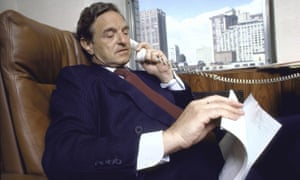
At work in 1986, two years after his first pro-democracy foundation was set up, in Hungary. Photograph: Getty Images.
He began by providing money and organisational support for pro-democracy movements across the communist bloc. The first Soros foundation was launched in Hungary in 1984; a symbolic early project involved importing photocopiers to help dissident groups spread their message. It was a basic premise that was updated years later in Russia, where Soros spent nearly $100m during the 90s connecting regional universities to the internet. Since then, he has funded a range of causes around the world, from cultural programmes to transformative end-of-life medical care; the one unifying theme is that they must contribute to Soros’s overall goal of promoting the “open society”. In a collection of essays and speeches published last month, called In Defense Of Open Society, Soros claims we are now living through a “revolutionary moment”. He remembers two previous such moments: the second world war and the collapse of communism, which marked the start of his philanthropy. Back in the 80s and 90s, as he pumped hundreds of millions of dollars into central and eastern Europe, he felt he was swimming with the tide. Repressive regimes fell, and the momentum seemed to be with the people and politicians who wanted more open and tolerant societies. And then, as Soros says, “The tide turned against me.”
Soros spends a minute trying to recall a name. He finds it, eventually – Martin Luther King Jr – and sombrely repeats his line that “the arc of the moral universe is long, but bends towards justice”. Then he subverts it, with a glint in his eye. “I don’t believe that’s true. I think you need to bend the arc.”
***
Born into a Jewish family in Hungary in 1930, Soros spent the second world war in hiding. His father had procured documents that gave him a false gentile identity, protecting him while German occupation forces and their Hungarian allies rounded up Jews and sent them to their deaths. In 1947, he left newly communist Hungary for Britain, where he worked in a series of menial jobs, including swimming pool lifeguard, train station porter and mannequin factory worker. In 1949, he gained admission to the London School of Economics, where he studied under the Austrian-born philosopher Karl Popper, whose concept of the open society made a lifelong impression. Popper’s key distinction was between closed societies that claim to possess one, ultimate truth to which the population must submit; and open societies, which allow and even demand that citizens make their own choices.
Having lived through both fascist and communist regimes, Soros became infatuated with this idea; he spent years reading and writing on the topic during his free time, and it continues to inform his philanthropic efforts. In his book, he explains that it is a principle that has to be defended again and again. “Open society will always have its enemies, and each generation has to reaffirm its commitment for it to survive.”
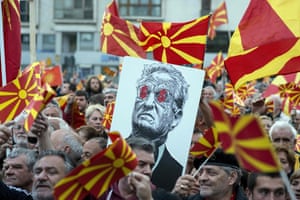
Protestors in Skopje, Macedonia, hold an antisemitic banner of Soros in 2017. Photograph: Getty Images.
Soros moved to the US in 1956. His plan was to get a job on Wall Street, make $500,000 on the stock market, then return to London to study philosophy. He got a series of trading jobs before managing one of the first hedge funds – using investments to take both long and short positions in the market. He turned out to be too good at making money to give it up, moving in and out of different markets quickly; he has said that a key part of his success lay in acknowledging and reversing his mistakes.
In 1992, Soros became famous as “the man who broke the bank of England”, as his bets against sterling contributed to Black Wednesday. The British government had to withdraw the pound from the exchange rate mechanism, and Soros pocketed around $1bn, for which he was vilified by the tabloids. He has expressed no remorse for making a fortune out of currency speculation, shrugging that others would do the same if he didn’t. He also claims that his personal role in Black Wednesday was exaggerated, but also that the timing suited him: he was looking for a bigger audience. “I deliberately allowed it to happen in order to establish a platform from which I could speak out on other issues,” he writes in the new book. “And it worked. Suddenly I had a voice that could be heard.”
At the same time, Soros significantly increased his philanthropic spending. Unlike most other big bureaucratic trusts, where decisions are taken by boards, he is personally involved in the discussions about where the money goes. Talking to him, you get the sense he is driven by structural injustices far more than by individual suffering.
On occasion, Soros has provided purely humanitarian aid: $50m to help the besieged citizens of Sarajevo during the Bosnian war; grants for more than 30,000 Russian scientists in the early 90s to keep their research alive. But he is most passionate when talking about long-term institutional reform than life-saving emergency assistance. When I ask what he is most proud of among all his projects, he talks about the incomplete but promising political progress made in Ukraine, where his foundation has supported a broad range of civil society programmes over decades. “I always wanted successes in the near term, and with experience I’ve come to the conclusion that real successes need 25 years,” he says. “Take a country like Ukraine: it had a number of revolutions, and they each failed, and now you had a free and fair election,” he says, referring to the vote earlier this year for president Volodymyr Zelenskiy.
In the 2004 Ukrainian election, exit polls conducted by a Soros foundation showed a very different result to the official count, and Viktor Yanukovych, who had “won” the first vote, was forced to concede. He came back to power in 2010, before being toppled amid violent clashes in 2014.
These revolutions, Soros says, were inevitable but not sufficient. “Dictators, if they are successful, always go too far, because there are no checks and balances to stop them… The point comes where people who have been cowed into obedience rebel, and there’s a revolution. Revolutions generally don’t succeed. You need to develop institutions, which is what open societies are all about.” In the past, Putin has blamed Soros for sparking unrest – something he denies, but in a qualified manner that would hardly reassure the Russian president. “It was the people of the country who rebelled,” he says. “And I enabled them to do it by various steps that the foundations took, like reliable exit polls.” It is this approach that has so exercised his critics: few authoritarians would feel threatened by the distribution of mosquito nets or emergency food supplies; but the funding of critical media, legal aid NGOs and minority rights advocacy groups is a different matter.
More recently, Orbán has emerged from a competitive international field to become Soros’s most ferocious critic. As a young anti-communist firebrand in the late 80s, Orbán and his fellow young democrats received funding from Soros through his new Hungarian foundation. Orbán even won a Soros-funded scholarship to study for a year at Oxford University in 1989. Three decades on, the Hungarian prime minister’s media outlets refer to a “Soros plan” to ship millions of refugees to Europe and destroy the continent; last year, his parliament passed a “Stop Soros” bill that, among other things, imposes a 25% tax on any organisation providing assistance to migrants. The Soros-founded Central European University has been forced to move much of its operations from Budapest to Vienna.
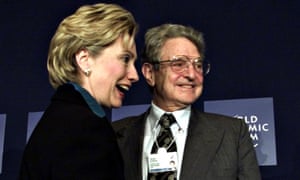
With then New York senator Hillary Clinton at the World Economic Forum in 2002. Photograph: Getty Images.
Like many of Soros’s rightwing critics, Orbán often employs barely concealed antisemitism in his attacks. Last spring, I watched the prime minister give a speech outside the ornately beautiful parliament building, on the same square where Soros lived as a child. “We are fighting an enemy that is different from us,” Orbán told a flag-waving crowd. “Not open, but hiding. Not straightforward, but crafty. Not honest, but base. Not national, but international. It does not believe in working but speculates with money; it does not have its own homeland, but feels it owns the whole world.” This succinct summation of antisemitic tropes was delivered just a few hundred metres from a monument marking the place where hundreds of Jews were executed by fascists during the second world war.
I asked Orbán’s spokesman, Zoltán Kovács, about the speech at the time and he denied it was antisemitic – even insinuating that my question was, because it implied that only Jews could be speculators. The Hungarian government’s problem with Soros, he said, was that he uses NGOs for political purposes, despite having no “mandate” to do so. “There’s a perception that if you say the word NGO, it goes without saying that it’s a good thing,” he argued. “But that’s not true.”
Many people – and not just rightwingers – might wonder if Kovács has a point. If you remove the antisemitism and political opportunism from Orbán’s attacks, is a leader like him right to fear the work of the Soros foundations? Soros shrugs, and sidesteps the question. “We are on opposite sides of our concept of a good society. I supported Orbán because at the time he was a very active supporter of open society. But he became an exploiter and the creator of a mafia state.”
Soros’s supporters would argue that what rightwing leaders consider “political interference” is merely backing for freer and more tolerant societies. Zuzana Čaputová, who was elected president of Slovakia in June, told me earlier this year that it is misguided for governments in the region to accuse Soros of political interference. A former civil society activist, Čaputová has received Soros foundation grants in the past, and strikes a very different tone. “Thanks to the money from this organisation, a lot of good and valuable work has been done in Slovakia,” she told me in April, shortly after winning the vote. “Most of the grants were broadly in support of democracy, rather than trying to dictate on specific issues.”
But in taking a side in the Brexit debate, for example, isn’t Soros straying into political ground? Yes and no, he says. “It falls into the category of what I call political philanthropy. Brexit is a process of disintegration that hurts both sides. It hurts Britain more on a pro rata basis and Europe more in absolute terms. Most importantly, European values can be better defended if the two of them are united. My contributions were not used for partisan or electoral purposes. They were used to educate the British public.”
***
An hour into our interview, Soros asks if we can take a break; the batteries have run out in his hearing aid. His wife Tamiko appears and they leave the room together for a couple of minutes to change them. When he returns, we get back to the subject of the man from farther down Fifth Avenue. Soros doesn’t like getting personal: he is careful, even when it comes to Orbán, to say that theirs is a battle between competing ideologies; he won’t be drawn into the mudslinging. But Trump, for whom his disdain is explicit, is the exception. “I think he’s a brilliant confidence trickster, who has succeeded beyond his own expectations,” he says. “It’s the fulfilment of the dream of a narcissist, and that’s what carries him forward.”
Nevertheless, Soros thinks this combination of self-regard and insecurity has led the president to make terrible decisions. “In a way, we are lucky to have him because of the internal contradiction in him – he is his own worst enemy. He’s digging his own grave, because of his addiction to narcissism.”
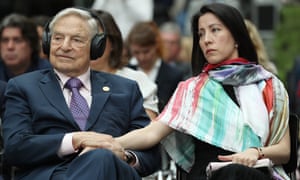
With his wife, Tamiko Bolton, at the opening of the European Roma Institute for Arts and Culture in 2017. Photograph: Getty Images.
In recent years, Soros has become one of the biggest donors to Democrat causes and candidates. Of the current crop of contenders, he insists he does not want to endorse any candidate publicly: “This is not something that a major donor ought to be deciding – it should be decided by the electorate.” Nonetheless, he speaks of Elizabeth Warren in glowing terms. “She has the experience and energy for the job. She understands the flaws of the prevailing system and has many innovative ideas about how to fix them. She would make mincemeat out of Trump in debates.”
He also likes Warren’s plans for increased taxes on the rich. Despite his handsome profits, Soros considers himself a long-standing critic of the current financial system. “The disparity in wealth in the United States certainly contributed to the rise of Trump,” he says. As far back as 1997, he wrote that laissez-faire capitalism, with its certainty in the supremacy of the market, was a new threat to any open society. He tells me he would levy a wealth tax on the super-rich – including himself – because it is the best way to fund the necessary spending on the climate crisis, an area where he feels Trump’s presidency is a particular disaster. “There is a connection between the problems of open society and the problems of climate change… You’ve got somebody like Trump who actually denies it, and that really makes it very hard to take the steps which are necessary to bring it under control,” he says.
Meanwhile, as the temperature of anti-Soros rhetoric has risen, his staff have been taking his safety more seriously. Last year, an explosive device was mailed to Soros’s upstate New York residence. It was quickly detected and nobody was injured, but it showed that the threats to his life were not hypothetical. Has it restricted his movements? “I am willing to risk my life for my ideas and beliefs when necessary, but I don’t expose myself to unnecessary danger,” he says. It is unlikely that he will return to Hungary while Orbán is in power, he says, fearful that the relentless propaganda could inspire a physical attack. “It’s quite dangerous because he has got some blind followers, just like Trump, and they may try to get me.”
A few days after we meet, Soros attends a board meeting of his US foundation, where the discussion focuses on how its work can be adapted to address the altered political landscape. Already Soros has made a $10m donation to a programme aimed at tackling the upsurge in hate crime in America. The 2020 budget for his US foundation has been set at $185m, nearly double the 2016 figure. “For the moment it’s the still-unresolved crisis of the developed world that needs most of our attention,” he tells me.

Alex Soros, expected to be his father’s successor in running the Soros foundations. Photograph: Getty Images.
Time is not on Soros’s side, but it is widely expected that his 34-year-old son, Alex, will be his successor when it comes to running the foundations. I ask Soros if he is scared of dying. “It’s the loss of consciousness that is so frightening for a person like me, who is so involved in thinking and understanding the world. But dying is a natural consequence of having been born and so it’s nothing to be afraid of,” he says. Is it something he thinks about a lot? “Originally, I wanted to spend my money while I am alive, but then I realised that would be very selfish. There are a lot of other people who have devoted their lives to working for the foundation and I owe it to them to allow the foundation to continue beyond my life.” As is the case many times in the interview, he has answered a slightly different question to the one I asked. I leave unsure whether this is the confusion of old age or, more likely, a canny tactic to divulge information on his own terms.
In his new book, Soros describes 2016 as the “nadir” in terms of the move away from open societies – with the vote for Brexit and the election of Trump. He tells me he now sees some signs that “the tide is turning again”: there is the increasing momentum around the Trump impeachment discussion, and then there was the European parliament election earlier this year, in which nationalists did not do as well as many had feared. As someone who experienced the horrors of Nazi-occupied Europe, does he think those who draw comparisons to that era are wide of the mark – or could the world be heading to a truly dark place?
“We certainly can’t exclude it,” he says. But that depends on all of us, he thinks. “We can’t passively wait for things to go right. We have to act on our principles, even when the situation appears hopeless.”